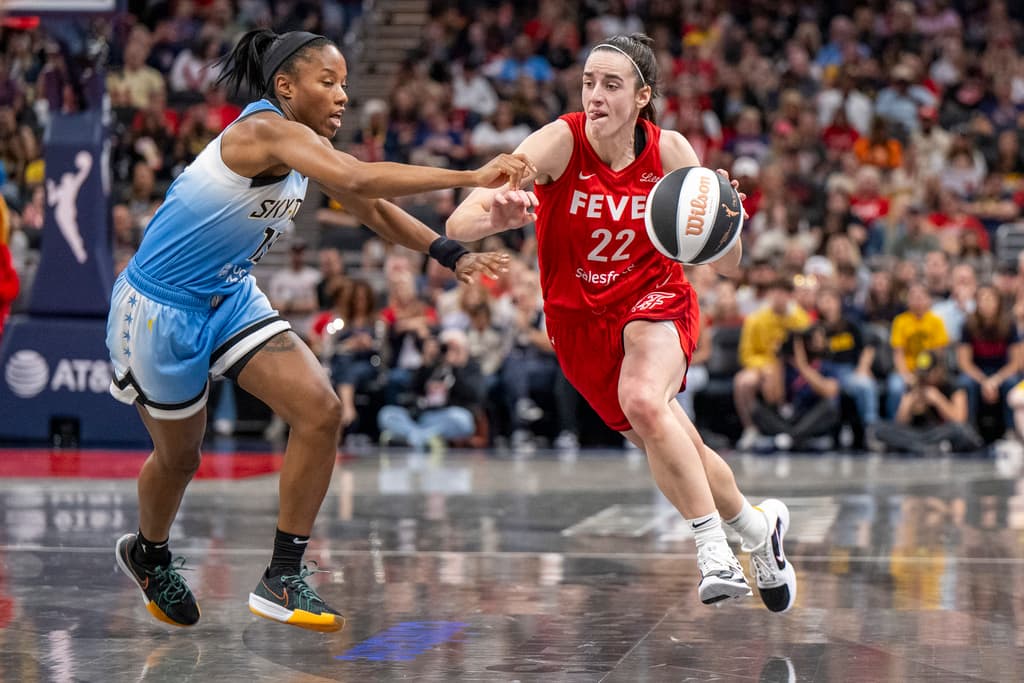WNBA Upgrades Foul for Unprovoked Shoulder Shot on Caitlin Clark by Chicago’s Chennedy Carter
The jealousy and pettiness displayed during Saturday’s game conjure memories of Tiger Woods’ early years.

Cheap shots in sports are kind of like porn — you know it when you see it. It normally occurs as an unexpected, sometimes unprovoked attack, usually from the blindside when the target least expects it.
The hard shoulder check delivered by Chicago guard Chennedy Carter on Indiana’s Catlin Clark during the third quarter of their WNBA game Saturday in Indianapolis was a blatant cheap shot that deserves a suspension and sizeable fine to send a proper message that such actions won’t be tolerated whether against Ms. Clark or anyone else.
Indiana defeated Chicago 71-70 in a game billed as the first meeting between Ms. Clark and Chicago’s first-round pick, Angel Reese, who has raised the profile of women’s basketball to unprecedented heights. But instead of talking about a tight, competitive nationally televised contest, the post-game focus was on Ms. Carter’s shoulder check that was ruled a simple foul instead of deemed flagrant or worthy of a technical.
The WNBA on Sunday upgraded Ms. Carter’s foul to a flagrant-1 violation and fined Ms. Reese $1,000 for not attending a post-game interview, but that was it. The WNBA also fined Chicago $5,000 for failing to ensure that all players comply with the league media policies. The punishment against Ms. Carter should be more severe.
During a television interview just before the fourth quarter, Ms. Clark said the unexpected blow was “not a basketball play,” but she didn’t add much more after the game saying, “It is what it is. It’s a physical game, go make the free throw and then execute on offense. Feel like that’s what we did.”
Ms. Clark totaled 11 points, eight rebounds, and six assists as Indiana improved to 2-8 on the season before playing at the New York Liberty Sunday night.
After the game, a defiant Ms. Carter refused to justify her actions. “I ain’t answering no Caitlin Clark questions,” she said.
The incident could be ignored if it were a single isolated act during the heat of competition. But it isn’t. The hard physical contact Ms. Clark has endured since making her WNBA debut is escalating to unprovoked cheap shots that reek of jealousy and pettiness.
Indiana Fever GM Lin Dunn has seen enough. She took to Twitter posting, “There’s a difference between tough defense and unnecessary-targeting actions! It needs to stop! The league needs to ‘cleanup’ the crap! That’s NOT who this league is!!”
Ms. Clark, who has drawn three technical fouls for complaining to officials, shouldn’t be given any more protection than any other player in the WNBA. But she shouldn’t have to keep her head on a swivel either. Clearly, some players in the WNBA are envious of the attention — and endorsement money — she receives.
It reminds me of 1997, when a 21-year-old Tiger Woods became the focus of professional golf after winning his first Masters. He wasn’t exactly embraced by many of the established veterans on tour who were unsettled if not threatened by all the attention the young phenom was getting.
Fuzzy Zoeller, winner of the 1979 Masters, didn’t exactly applaud Mr. Woods for winning the first of what would be five Green Jackets. Referring to a potential menu for the Champions Dinner, Mr. Zoeller told reporters, “Tell him not to serve fried chicken next year. Got it. Or collard greens or whatever the hell they serve.”
Mr. Zoeller issued an apology, saying his remarks weren’t racist. At the very least they suggest the kind of jealousy and resentment Mr. Clark is facing in her first year in the WNBA.
Mr. Woods brought unprecedented attention to golf, media rights for broadcasts soared, tournament purses increased, golf became cool and golfers became athletes. Manufacturers of golf equipment and golf apparel all benefited. Golf courses, both private and public, enjoyed an increase in customers playing the game. Everyone made money.
That’s already happening for the WNBA because of Ms. Clark and Ms. Reese. From sellout crowds to private planes to expanding off-the-court opportunities, everyone in the WNBA benefits from the attention and exposure Ms. Clark is generating.
It’s disappointing that when Ms. Carter imposed her unprovoked shoulder check, no one came to Ms. Clark’s defense. Had it been an NBA game there’s little doubt there would have been some face-to-face if not fist-to-fist on-court confrontations.
Ms. Clark has voiced her thoughts on the physical nature of the WNBA. “I think everybody is physical with me,” she said earlier in the week. “They get away with things that probably other people don’t get away with.”
Those who suggest Ms. Carter’s shoulder blow was simply a hard foul and the physical nature of pro basketball are making excuses for a blatant flagrant foul that has no place in the game whether the target is the face of women’s basketball or a bench player. Hard basketball is getting knocked down while driving for a layup, strong contact positioning for a rebound, or a hard check on a screen. It’s not taking a hard shoulder to the back when you’re not looking and don’t have the ball.
The WNBA must start protecting Ms. Clark and halt its growing image as a league of petty, jealous cheap shots.

